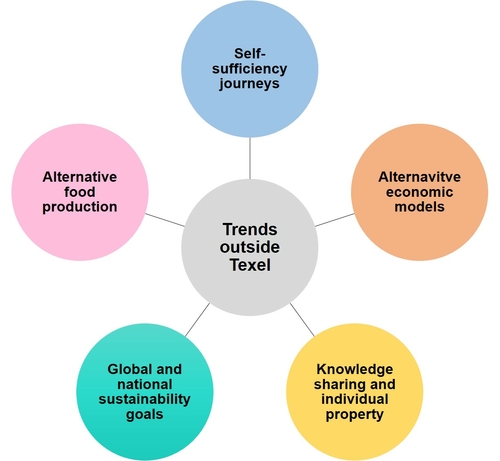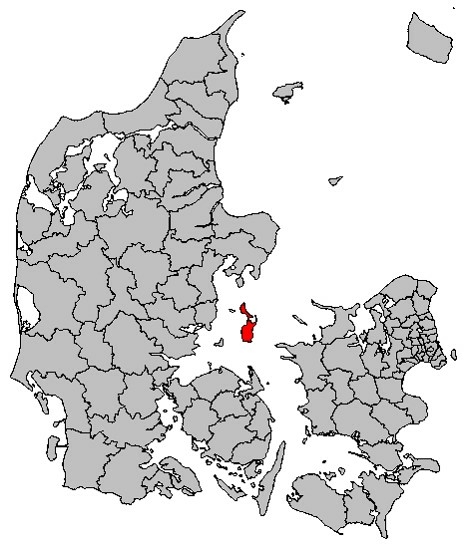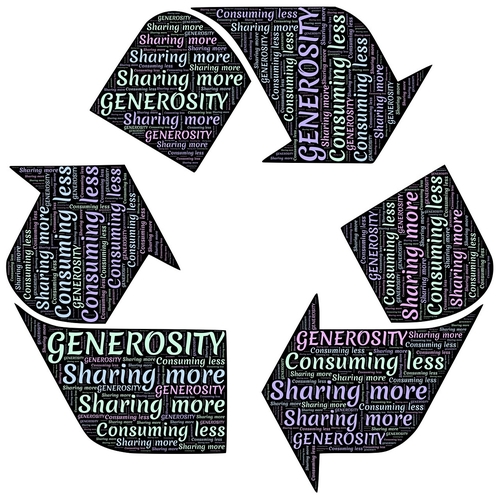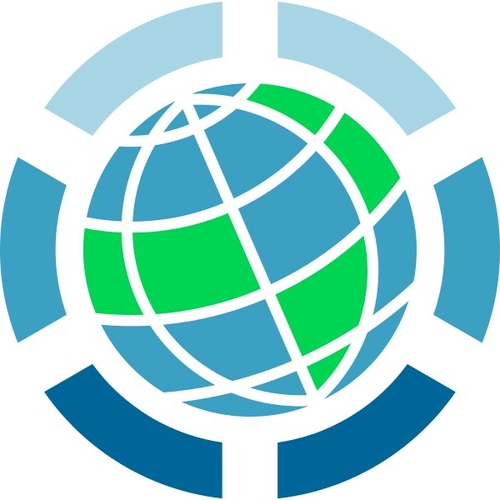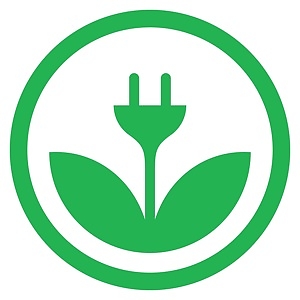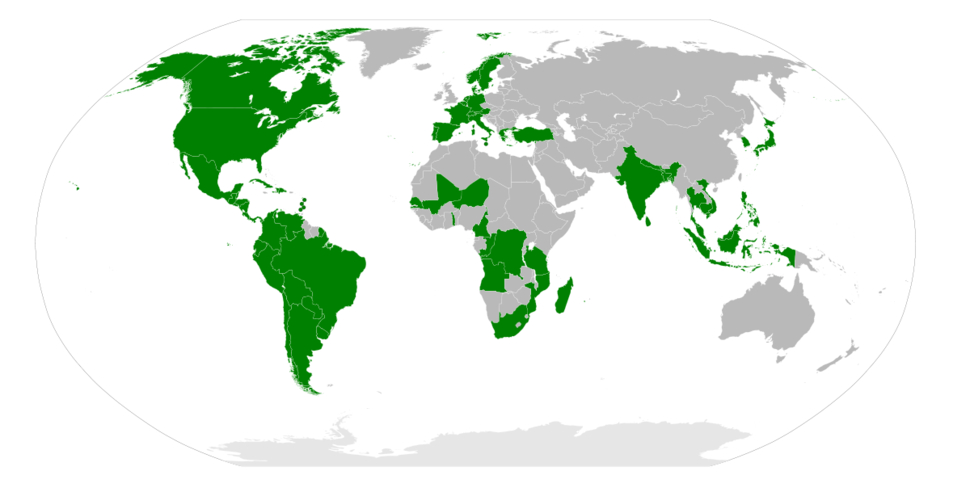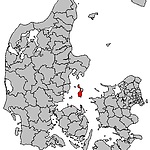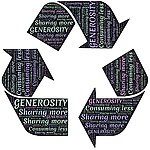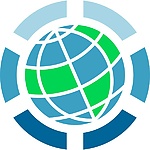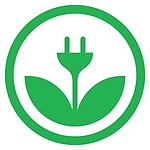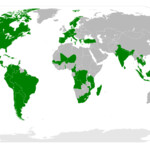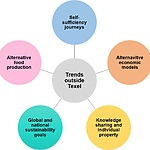Sustainability transitions are currently taking place all around the world. From the Brazilian Amazon to the Siberian taiga, people and organizations who push for sustainability can serve as inspiration for Texel’s transition; likewise, Texelaars’ experience can also provide lessons to those initiatives. To situate our research in the broader context of global sustainability innovations, our team researched relevant trends, innovations and inspirational initiatives elsewhere. During the process of designing the Permanently Innovate subsystem, this research may need further consideration to steer Texel's sub-system in the right direction.
We have grouped those relevant influences in five groups, according to their type. The figure below presents those groups.
Figure 1. Sources of inspiration for Texel's Permanently Innovate transition
1. Self-sufficiency journeys
Communities around the world are striving for self-sufficiency. Although motivations and objectives vary depending on the context, in most of the cases their journey is related to building resilience against the dynamic context outside their system. For islands, it is common to start the transition with energy initiatives, like in the case of Denmark’s Samsø or Spain’s Canary Islands. Moreover, for small island development states, self-sufficiency is a way of strengthening their economies and local development. For other cases, such as the Zapatistas communities in Mexico, transitions keep moving due to a strong sense of identity and desire for grassroots innovations. The list below presents some of those cases.
- Islands on self-sufficiency journeys:
- Canary Islands in Spain: El Hierro Natural Reserve
- Samso in Denmark
- Eigg in Scottland
- Dominican Republic
- Sao Tome, Grenada and Fiji: small island development states
- Non-island self-sufficiency journeys:
- Zapatistas Communities in Mexico
- Christiania in Denmark
Figure 2. Location of Samso (red) in Denmark
Lesson 1: Texel can drive inspiration for grassroots innovations from other self-sufficiency journeys. The cases in this category provide insights on how those innovations started, who started them and how they involved and keep involving people in and outside the community. Although the focus of this category is in the initiation and implementation of grassroots innovations, Texel can also learn from specific projects. For example, the way in which inhabitants in Samsø became shareholders in the island’s energy production system.
2. Alternative economic models
Similarly, people, communities and organizations are experimenting with alternative economic models. Concepts such as sharing economy, circular economy or crowd funding are enabling new patterns to emerge and are challenging the current and popular economic models.
- Sharing economy: peer to peer sharing of resources often coordinated by online means. Examples of the sharing economy model could include but not be limited to:
- Alternative models of accommodation, such as AirBnB or Couchsourfing.
- Alternative models for transportation, such as BlaBlaCar or Uber.
- Circular economy and the emergence of new business models. Include for instance, the idea of not owning a product, but leasing it. Examples for this are systems to share cars instead of buying them.
- Crowd funding: any citizen can start a project, which is funded by other normal people who believe in the idea. Usually, the process is conducted online.
- Closing the loops of waste: waste is material, so it is worth money. It is related to the notion of circular economy (or even included).
Figure 3. New ways of sharing resources
Lesson 2: Permanently Innovate in Texel can consider these examples in at least two ways. First, it can look at how companies such as AirBnB or Couchsourfing work. Second, it can consider their implementation as pilot innovative projects in the island.
3. Knowledge sharing and intellectual property
Parallel to alternative economic models, the landscape of knowledge sharing and intellectual property is also evolving. From open software such as Open Office or R Project to user’s reviews in Trip Advisor, users are finding ways to learn from each other in non-conventional schemes and their learnings are not limited to academic or scientific processes.
Moreover, ways of sharing are emerging mostly in the digital world, where people have also presence. Examples of knowledge sharing and individual property are listed below.
- Caroline Nevejan’s Research on presence.
- The TED talk concept: putting people together to share their ideas, such as this TED talk from Samso.
- Open Software with documentation and support that is built by users and is free of charge, such as Open Office, NetLogo, Quantum GIS or R Project, just to mention a few.
- Education systems. People around the world are transforming their teaching methods and content. For instance:
- Education to preserve identity and cultural heritage. In Mexico, Wixárika communities have developed their own methodologies and contents than bring together Western approaches and their own beliefs and cultural heritage. Recently, Santa Catarina Cuexcomatitlán started operating its own communitarian school.
- MOOCs, online courses that bring knowledge to massive audiences and free of charge for the users. These courses facilitate cooperation on a long distance. Examples are edX and Coursera.
- Intellectual property. Licenses designed to share the content with no cost, such as Creative Commons.
Figure 4. A globalized world
Lesson 3: Texel can learn about digital experiences and opportunities to support its sustainability transitions. Moreover, the digital world and Texel’s digital presence are likely to be a large component of a Permanently Innovate subsystem.
4. Global and national sustainability goals
Sustainability transitions require changes at a local and personal level. However, organizations around the world are influencing agenda-setting processes as well as national and global development priorities. Their actions often introduce sustainability notions into the landscape (although we could also argue that it is in fact a two –or more- directions process). Those organizations include but are not limited to the list below.
- At a global level, the United Nations set development targets that all countries should achieve. In 2015, the deadline to reach the Millenium Development Goals expired. Thus, the Sustainable Development Goals were structured and are now the new global target.
- Urgenda’s vision 2050 (Environmental NGO). Urgenda works mostly with sustainability and environmental transitions within the European Union. It has provided advice to the municipality of Texel.
- At a European Union scale, there are rules about sustainability that promote the reduction of emissions of gases with greenhouse effect.
- At the level of The Netherlands, the Dutch government also implements rules for the reduction of emissions of gases with greenhouse effect.
Figure 4. EKO Energy logo
Lesson 4: Texel’s Permanently Innovate transitions can find allies in broader global or national sustainability goals. They might find resources such as funding or knowledge to inspire and make possible Texel’s self-sufficiency ambitions.
5. Alternative food production
In addition to the previous categories, people around the world are also innovating regarding food production and consumption patterns. Projects and initiatives range from consumers who are more aware of the externalities involved in industrial food production and want to reduce their impacts, to farmers who are concern about soil degradation and cultural heritage. Innovation in the topic of food production involves, but is not limited to the following items.
- Local food: a movement trying to connect food producers and consumers in the same area, in order to build resilient food networks while reducing their environmental impacts.
- Organic and ecological farming: involves processes that consider ecosystem services and exclude the use of artificial fertilizers and pesticides, plant growth regulators, antibiotics, genetically modified organisms, poor quality water or nanomaterial.
- Fair trade certifications: seals that claim to guarantee consumers that the food (or any other product) that they purchase has been produced under certain environmental, labor and developmental criteria.
- Organic food certification: seals that claim to guarantee consumers that the food they purchase has been produced by organic means.
- Permaculture: production means that try to simulate and even preserve the ecosystem processes that lead to food production.
- Social movements such as Via Campesina, which is a movement of agricultors all over the world defending their seeds, gender equality, farmers rights, agrarian reforms, between others.
Figure 6. Countries who were members of the Via Campesina movement by 2008
Lesson 5: Texel’s Permanently Innovate transition can learn from the opportunities that alternative food production has brought for sustainability transitions, including business cases for potential entrepreneurs. Food production is only one of the areas in which these opportunities can occur. Similar processes can take place in different areas, such as closing the water loop or closing the materials loop.

